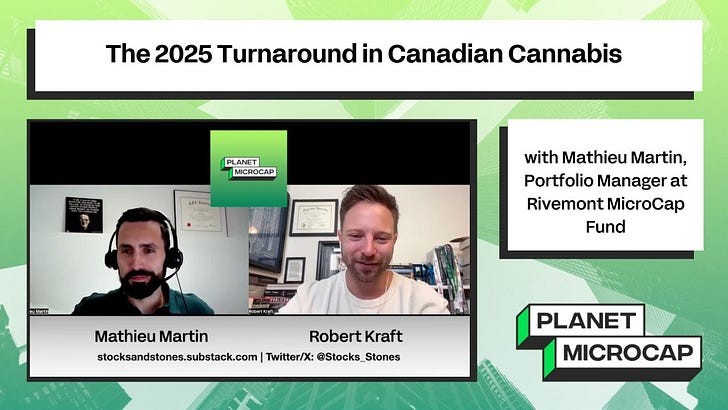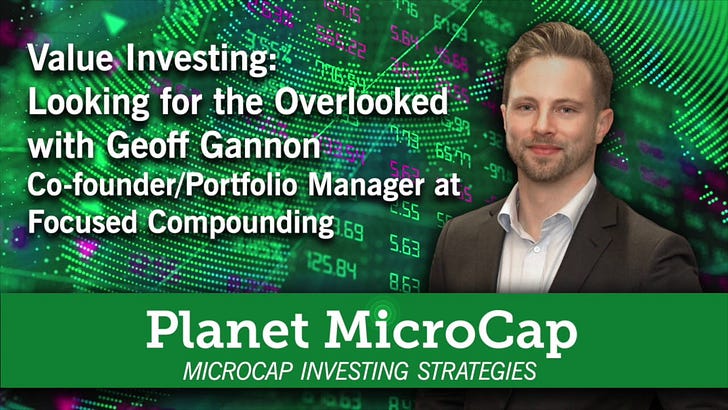Today, I'm sharing with you our annual Planet MicroCap Podcast: LIVE! panel from the Planet MicroCap Showcase: VEGAS 2025 in partnership with MicroCapClub. Joining me this year are:
Thomas Bachrach, PFH Capital
Website:
https://www.pfhcap.com/
Twitter/X: https://x.com/PFHCapital
Jason Hirschman, Hudson 215 Capital
Twitter/X: https://x.com/EightTrack180
Whit Huguley, River Oaks Capital
Website:
https://www.riveroaks-capital.com/
Twitter/X: https://x.com/Whit_Huguley
PLUS, Special Guest appearance from: Kevin Shea (Twitter/X: https://x.com/thegoodprick)
Watch on YouTube:
Abridged outline (thank you, Shai!):
1. Fund Philosophies and Approaches to Micro-Cap Investing
PFH Capital – Thomas Bachrach
A small, concentrated (10–20 ideas) long-only value fund with very low turnover and a distinctly international orientation. Bachrach believes the most attractive combinations of growth, quality, and price are found outside the United States—particularly in Asia—where there is far less investor competition.
“We take a very international focus—very little in the U.S. The quality you can get, the growth you can get, for the price you pay is simply more attractive overseas.”
River Oaks Capital – Whit Hugley
Five-year-old micro-cap, long-only fund holding 10–15 companies. Hugley applies private-equity-style due diligence: on-site visits, conference attendance, and conversations with competitors and industry experts. He also practices “suggestivist investing,” offering capital-allocation ideas (buybacks, asset sales) to management. A core tenet is partnering with A+ CEOs.
“I launched River Oaks in 2020 and was shocked how few public-micro-cap investors do rigorous on-the-ground work.”
Hudson 215 Capital – Jason Hirschman
A family office focused exclusively on micro and small caps. Hirschman looks for “future great businesses while they are still awkward teenagers,” joking that if things go badly he can always become a Walmart greeter.
2. Navigating Volatile Market Conditions
Jason Hirschman
The first rule—bull, bear, or volatile market—is knowing what you own. Volatility is the moment to re-test convictions, keeping the truly valuable (“protect Philippe”) and discarding the “fake Rolex.” He cautions against structuring a portfolio around hoped-for future heroes when one tweak can change everything.
“Volatility tempts you to be a hero, but this is not the time. Be cautious.”
Whit Hugley
Having launched just before COVID-19 (and enduring an early 30 % draw-down), Hugley is unfazed by swings; he uses sell-offs to increase stakes in “wonderful companies.” Tight insider ownership in micro-caps often reduces forced selling. A wide margin of safety at purchase and A+ CEOs—like Doug Campbell at America’s CarMart—are critical.
“For whatever reason, market drops don’t bother me. I just add to the great businesses we already own.”
Thomas Bachrach
He rarely checks quotes, taking a multi-generational view. Volatility is welcome because price dislocations versus intrinsic value are the lifeblood of value investing. Today’s unprecedented global leverage ensures more bouts of turmoil ahead. The antidote: own companies you understand and love, and shun those burdened with financial or operational leverage.
“Our intrinsic-value estimates don’t change as quickly as stock prices. Volatility is a gift.”
3. Tariffs and International Investing
Thomas Bachrach
Sees current tariff rhetoric as an attempt to address the U.S. net-investment deficit, now roughly –$25 trillion versus –$2.5 trillion in 2003. Capital outflows are inevitable, creating a generational chance to buy absurdly cheap exporters—especially in Asia. He avoids companies heavily reliant on U.S. exports.
“When that reversal comes, you’ll want to be positioned in net-exporting markets trading at irrational prices.”
Whit Hugley
Calls CEOs directly to gauge tariff impact, concluding tariffs will prove inflationary. Avoids businesses with large variable-rate debt that could force dilutive equity raises.
Jason Hirschman
Warns against turning overly bearish on the U.S.; American ingenuity endures. His tariff lens focuses on production hubs, management’s relocation experience, and supply-chain complexity—the nitty-gritty details.
4. The Value of Qualitative Due Diligence & Management Interaction
Thomas Bachrach
Prefers the post-conference bar for candid insights; relaxed managers reveal far more than on a trade-floor podium. Seasoned investors develop sharp “B.S. detectors” to distinguish genuine dialogue from rehearsed pitches.
“Put a drink in their hand at 7:30 p.m., and you’ll get real information.”
Whit Hugley
One-on-one meetings are vital in micro-cap land. An A+ CEO speaks owner-to-owner—open about strengths, weaknesses, and mistakes. He cites Jim Collins’s “Level 5” leader: personal humility plus professional will. Meeting Dayton Judd of FitLife cemented Hugley’s conviction in finding such leaders.
“Almost every successful investment I’ve made involves an A+ CEO.”
Jason Hirschman
Reminds investors that management teams are human and often exhausted by conference schedules; show a little rachmones (mercy). Authenticity matters more than polish.
Kevin Shea
Begins meetings with: “Tell me what you do in 25 words or less—at 26 I start snoring.” Then, “Why are you the CEO?”—not for the answer but to watch the reaction. His bluntness sparks genuine conversation.
5. Site Visits and International Experiences
Whit Hugley
Early site visits revealed how few investors show up; one company hadn’t hosted an investor in years. Only a handful of A+ CEOs emerge annually, usually in niche, fragmented markets. Site visits also quickly eliminate seemingly cheap but uninvestable firms.
Thomas Bachrach
With young children, he travels less but relies on a trusted network. His due-diligence “hack”: find the local expat bar where professionals from many industries unwind and share off-the-record insights.
Jason Hirschman
Sees overlooked opportunity in European small-growth stocks—especially the Nordics—where safer business models, high-quality management on lower salaries, and balanced growth/profitability prevail. A Stockholm visit to Haypp Group (nicotine pouches) underscored how under-followed the region is. He questions whether U.S. micro-cap multiples will stay elevated if foreign markets regain leadership.
6. Identifying A+ CEOs and Making “Great Money”
Whit Hugley
An A+ CEO is honest, capable, and long-term oriented, thriving in niche markets where competitors lack drive. High return on equity is a result, not the starting point.
Jason Hirschman
To earn great money, invest before the company achieves stellar ROE—when judgment about leadership, model, and industry is still qualitative. Selling remains a personal formula; even Charlie Munger admitted there’s no perfect answer. For Hirschman, the trigger is often lost confidence, complacent management, or, ultimately, opportunity cost.
“If you wait for the numbers, you’ll make good money. To make great money, you must decide before the numbers arrive.”
Planet MicroCap Podcast is on YouTube! All archived episodes and each new episode will be posted on the Planet MicroCap YouTube channel. I’ve provided the link in the description if you’d like to subscribe. You’ll also get the chance to watch all our Video Interviews with management teams, educational panels from the conference, as well as expert commentary from some familiar guests on the podcast.
Subscribe here: http://bit.ly/1Q5Yfym
Click here to rate and review the Planet MicroCap Podcast
The Planet MicroCap Podcast is brought to you by SNN Incorporated, The Official MicroCap News Source, and the Planet MicroCap Review Magazine, the leading magazine in the MicroCap market.
You can Follow the Planet MicroCap Podcast on Twitter @BobbyKKraft













Share this post